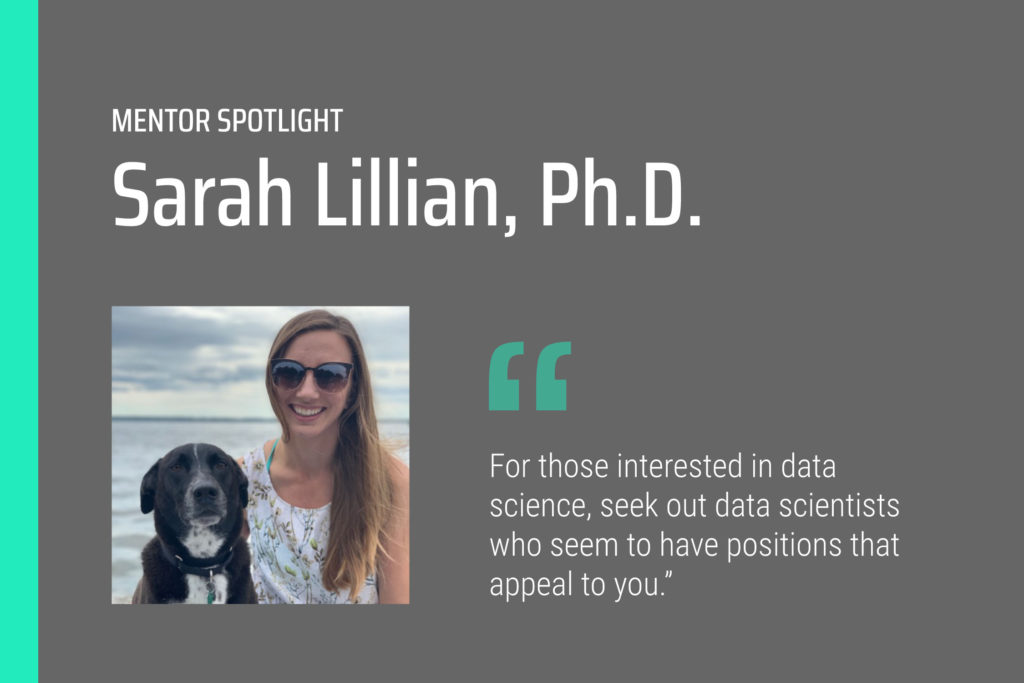
Rewriting the Code’s community of women pursing degrees and careers in technology includes the RTC Mentors – hundreds of volunteer mentors who give their time to share their expertise and accelerate student success through a 1:1 matching program.
Many of these professionals work as engineers who offer diverse backgrounds and experiences, which provide the student community access to unique insight into the field and resources for career placement and transition.
The RTC Mentor Spotlight Series is designed to showcase some of our mentors who are passionate about lifting up women in tech.
If you are an RTC member and interested in finding a mentor, navigate to the MENTOR tab in your teamRTC account!
For professional engineers interested in joining our community as an RTC Champion, complete the interest form here.
Mentor Profile:
Name: Sarah Lillian, Ph.D.
Title: Data and Insights Leader
Company: Cameo
Alma Mater: University of California, Riverside
LinkedIn: https://www.linkedin.com/in/sarah-lillian/
How did you become interested in tech?
I found my way into the tech industry almost by accident. All through college and grad school I was focused on biology, saw myself as not particularly good at math or computers, and thought I’d end up with a job as some kind of field biologist. After graduate school, I accepted a referral from a friend into a data analytics role. A critical benefit of my studies and amazing mentors was the skillset I developed in statistics, experiment design, and just enough R programming to make me employable. That first position, through the benefit of networking, made the rest of my career so far possible. Since my entry into analytics & data science, I’ve discovered my interests lie with specialization in product development and AB testing (along with recruiting and outreach to welcome a more diverse pool of candidates into this field!).
What experiences were instrumental in preparing you for your current role?
Technically, the skills that made my career possible have been experience using and coaching others in the use of applied statistics, along with the drive to learn how to code first in R, then in Python. But skills will only get you so far. My first two jobs out of school were via direct referrals. It has been critical to accept help when it has been offered, be willing to risk the vulnerability to say ‘I don’t know’, and to seek out feedback from supervisors, mentors, and colleagues who can help me see my weak spots. No career is built independently, no one gets where they are without help. It is thanks to the help I’ve received thus far that I’ve made it to where I am now – and even now I have moments of self doubt and imposter syndrome.
What’s your favorite advice you would give someone who is considering a career in your industry or role?
Data science is a broad and diverse field, there are lots of different kinds of roles that are called ‘data scientists’. For those interested in data science, seek out data scientists who seem to have positions that appeal to you. Ask them how they got where they are, what tools and technologies they use, and the knowledge they are expected to have on a day-to-day basis. You can find folks to reach out to via LinkedIn (cold call style messages can work if they are personalized & have a specific question!), meetup groups, and career networking platforms like RTC!
How do you maintain work-life balance?
I maintain work-life balance largely by communication. This communication occurs early in the form of setting my desired work schedule and requesting time off. I’ve found it most challenging to maintain work-life balance when I’ve felt behind on completing a project against a deadline. This is the most crucial time to communicate with the relevant parties to adjust priorities, and set clear expectations about what is possible and what support I need to accomplish goals. When I’ve felt like I’m having trouble maintaining my desired balance, communicating this with my manager has been very helpful for identifying solutions. Beyond this, I try to maintain healthy habits that create and maintain a sustainable balance – I don’t check my email or messages outside of work time, I log off at the end of the day and set my work aside until the next workday.